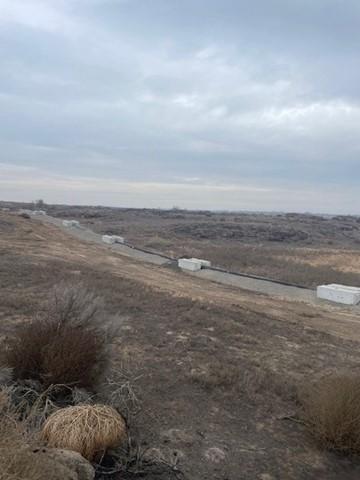Managing Wildlife Populations
Oak Creek Wildlife Area Elk Feeding Operations: The Oak Creek Wildlife Area is preparing for winter elk feeding activities. Supplemental feed and alfalfa were delivered to the Cowiche Unit feeding area in anticipation of winter weather and elk movement into lower elevations.
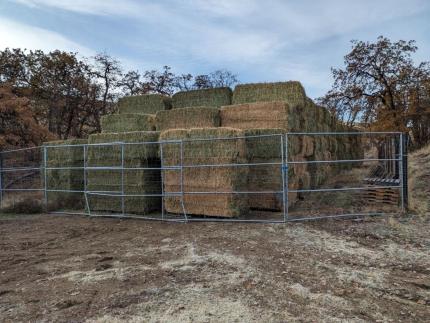
Region 3 Sage Grouse Working Group: Region 3 Wildlife Biologists Fidorra, Wampole, and Moore, and other state staff members met in Ellensburg for the annual Sage and Sharp-tailed Grouse Working Group meeting. Populations are at a historic low. Data on genetics, translocations, fire, funding opportunities, and restoration progress were discussed.
District 8 Grouse Harvest Monitoring: District 8 Biologists Wampole and Moore continue to check and collect wings from the four grouse wing barrels within the district. The Washington Department of Fish and Wildlife (WDFW) collects wings and tails of hunter-harvested forest grouse (spruce, ruffed, dusky, and sooty species) from Sept. 15 through Jan. 15.
The goal of this collection effort is to build estimated population trend datasets for each species to evaluate harvest changes. Other factors will also be evaluated, including wildfire and weather patterns that may contribute to changes in harvest and overall populations at the species level. Grouse hunters can help our monitoring efforts by depositing one wing and the tail of each grouse that they harvest into wing collection barrels placed around the state or by bringing them to the closest WDFW district or regional office. More information about these efforts and specific barrel locations can be found online.
District 8 Wildlife Camera-trapping: District 8 Wildlife Biologists Wampole and Moore spent several days in the field deploying trail cameras to survey wildlife distributions, abundance, and behavior.
Providing Recreation Opportunities
Wenas Wildlife Area Mountain Biking Coordination: Wenas Wildlife Area Manager Hughes met with the president of the Kittitas County Evergreen Mountain Bike Alliance to discuss the agency's overall plan for recreational management. Hughes has fostered an effective working relationship with the local chapter throughout the past couple of years. The chapter will be doing volunteer work on approved trails this spring for routine maintenance.
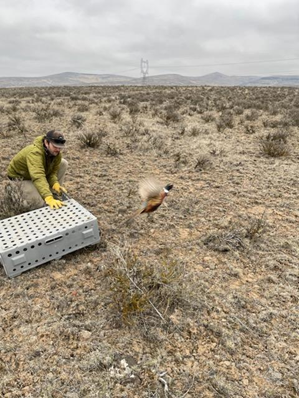
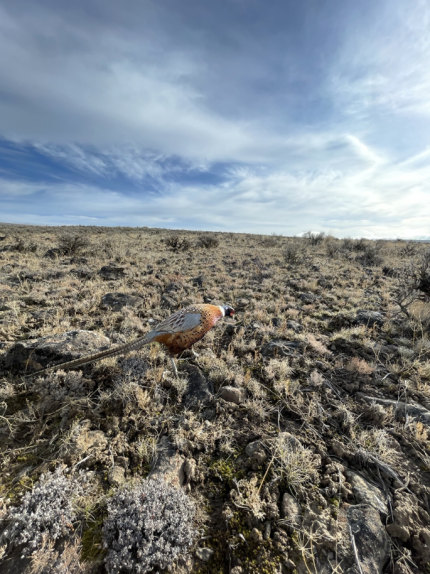
New Colockum Sno-Park: Colockum Wildlife Area Manager Lopushinsky and Assistant Manager Hagan worked to create a new winter non-motorized sno-park at the Orr Creek Road Junction. This concept was developed in the Naneum Ridge to Columbia River Recreation Plan, as well as in the subsequent Stemilt-Squilchuck Recreation Plan. Colockum Wildlife Area staff members purchased and installed a new vehicle gate and leveled a space for vehicle parking. A local backcountry ski and snowshoe group is working to build a kiosk to post new signage.
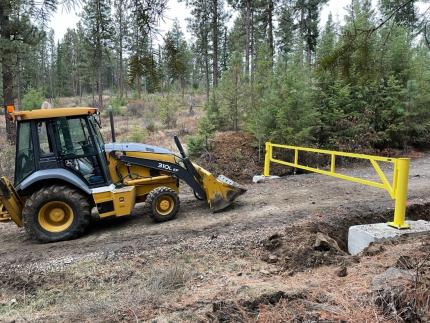
District 4 Pheasant Releases: District 4 Wildlife Biologist Fidorra and Natural Resource Technician Manderbach released pheasants at U.S. Army Corp of Engineers and WDFW properties in Franklin County. The roosters from WDFW’s Bob Oake Game Farm arrived on time and were in great condition as usual!
Annual Big Game Season Setting Adjustments: District 4 Wildlife Biologist Fidorra submitted minor date changes for deer and elk permits for the 2024-2025 season. These proposed changes match permits to appropriate hunting seasons or avoid conflict with other hunts.
Providing Conflict Prevention and Education
Wenas Elk Fence Fall Check: All Wenas Wildlife Area staff members participated in the fall elk fence check of 49 miles of fence. They started out on steep areas that need to be hiked into before poor weather arrived. A majority of the elk fence has been checked and the remaining fencing will be checked throughout the rest of November.
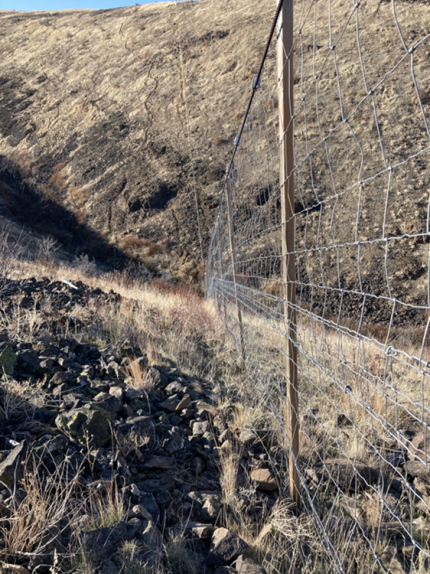
Conserving Natural Landscapes
Teanaway Valley Unit Planting: L.T. Murray Wildlife Area staff members monitored work during the week of Oct. 30, as a contract planting crew from Ash Creek Forest Management planted 3,200 ponderosa pine saplings in the Teanaway Valley Unit lower meadow area to increase vegetation biomass and shade for the Teanaway River to improve water quality.
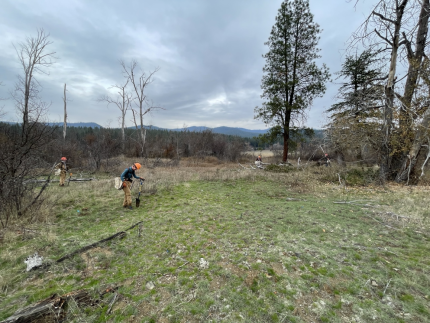
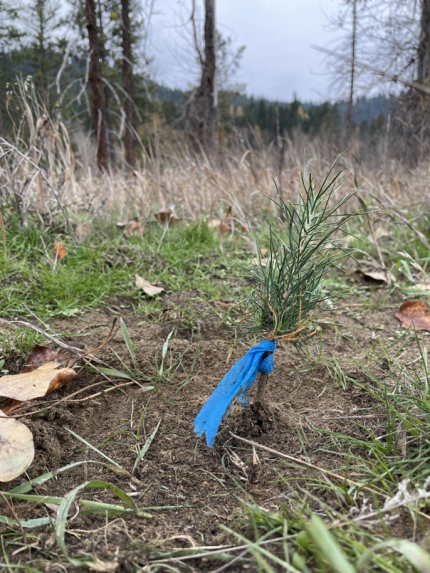
L.T. Murray Vantage Fire Restoration Planting: During the weeks of Oct. 30 and Nov. 6, members of the L.T. Murray crew and Washington Conservation Corp planted roughly 11,200 big sagebrush, rabbitbrush, and bitterbrush plugs in the Phase 1 restoration area within the 2022 Vantage fire scar (near the Pumphouse Road entrance area). They completed the work with the help from Stelle Cultural Resource Group. We are excited to complete Phase 1 and are motivated to move forward with the remaining three phases of restoration of the amazing sagebrush steppe habitat on the Whiskey Dick and Quilomene units!
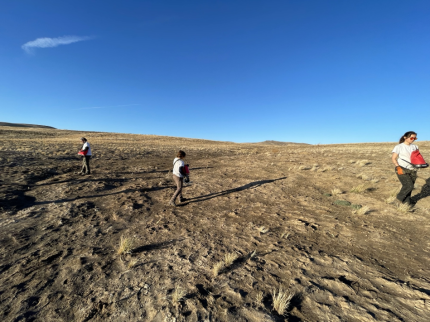
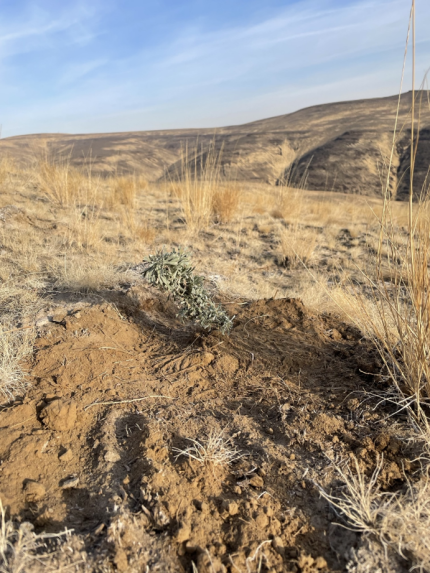
Wenas Bull Pasture Restoration: Staff members from the Wenas Wildlife Area are restoring approximately 130 acres off Bull Pasture Road into native grass seed. This site has been chemically fallowed for two years to prep the bed prior to seeding and to gain better control of the cheatgrass and bulbous infestation. Natural Resource Technician Trahern and Assistant Manager Taylor started harrowing and seeding the Bull Pasture area rehab.
Wenas Tree and Shrub Planting: Wenas Wildlife Area Habitat Specialist Miller, Natural Resource Technicians Janes and Stoltenow with the help of a Washington Conservation Corp crew from Wenatchee, finished up the planting of approximately 15,000 shrub plugs on various sites around the wildlife area. These shrubs are planted in areas that have had previous disturbances and the plugs should give recovery a head start.
Sunnyside/Snake River Byron Fire Restoration: Sunnyside/Snake River Wildlife Area Manager Kaelber, Assistant Manager Jahns, and Natural Resource Technician Manderbach picked up 2,000 shrubs from Plants of the Wild Nursery in Tekoa and delivered them to a staging area in the Byron Unit where they will be planted in the coming weeks. The shrub planting is part of ongoing post-fire restoration efforts following last year’s wildfire. Sagebrush and a variety of riparian shrub species will be planted throughout the unit.
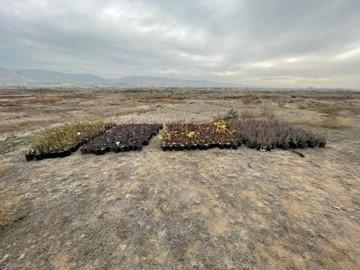
Providing Education and Outreach
Oak Creek Wildlife Area Community Service Project: A group of Naches Valley High School seniors helped Oak Creek Wildlife Area Assistant Manager Charlet prepare the Cowiche Unit elk feeding site for upcoming winter feeding. Students collected baling twine pieces and garbage from the feed site to reduce the risk of elk consuming garbage during winter feeding.
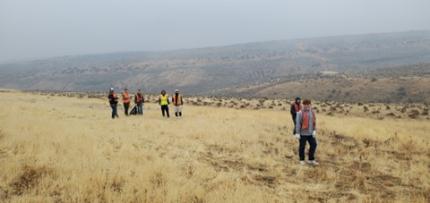
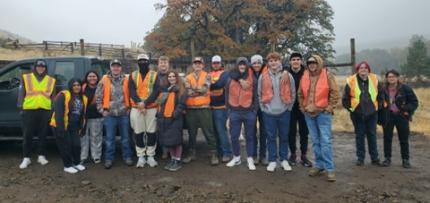
Oak Creek Wildlife Area Winter Feeding Signs: The Oak Creek Wildlife Area staff members collaborated with Naches Valley High School students and Shop Teacher Worby to produce new elk feeding area signage. Naches students produced 16 new bilingual signs to provide information to Oak Creek Wildlife Area visitors.
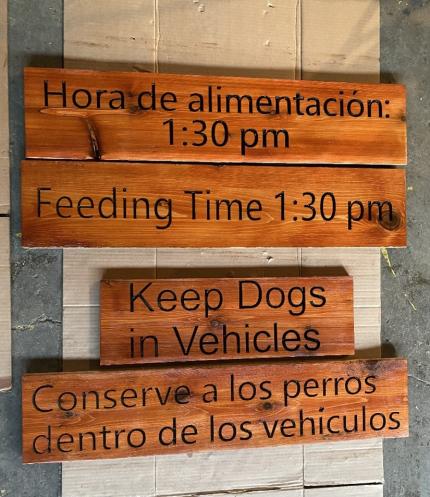
Kittitas Environmental Education Network (KEEN) Meeting: Wenas Wildlife Area Manager Hughes and Wenas Habitat Specialist Miller participated in a workshop put on by the Kittitas Environmental Network. The workshop focused on management in the Yakima River Canyon. Representatives from different agencies, recreational user groups, and local neighbors were present. Hughes and Miller presented a talk on habitat work done by WDFW within the Yakima River Canyon and discussed plans for future restoration efforts.
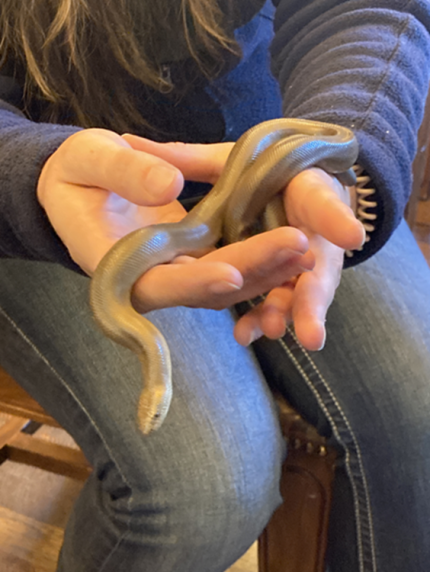
Conducting Business Operations and Policy
New Region 3 Private Lands Biologist Hired: District 4 Wildlife Biologist Fidorra and a panel of Private Lands and Wildlife Program staff members conducted interviews for the vacant Regional Private Lands Biologist position. An offer was made to the top candidate who accepted the position and will be starting Dec. 1.
Other
Sunnyside/Snake River Byron Pipe Project: Sunnyside/Snake River Wildlife Area staff members were pleased to see the pipe project at Byron Unit was near completion. Contractors have been working the last two months to replace infrastructure that was lost in last year’s wildfire. Once completed, water will be pumped into the network of small wetlands within the unit, providing habitat for migrating waterfowl.
